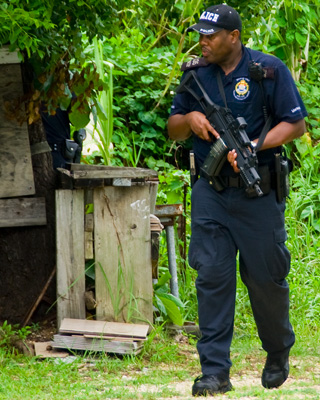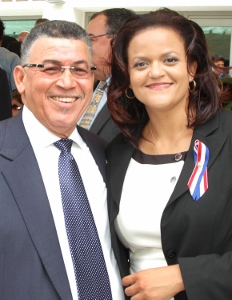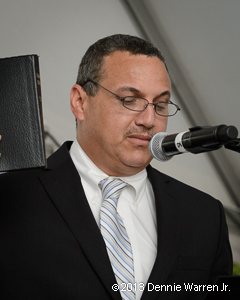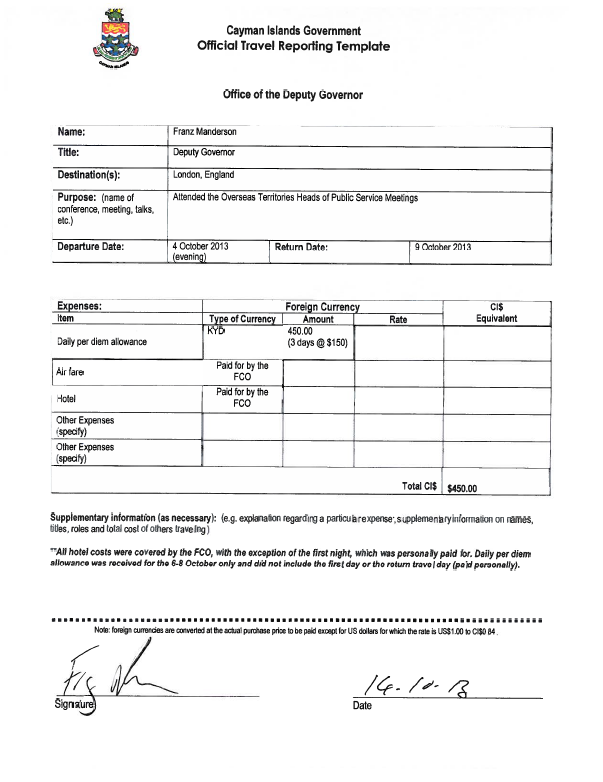Archive for October 15th, 2013

Cops stretched by crime spike
 (CNS): The three murders in Grand Cayman as well as a string of violent robberies in less than a month have stretched resources but Chief Superintendent Kurt Walton said theRCIPS is working hard to continue policing the regular day to day issues as well as dealing with the need to restore peace and normalcy to the community. The senior RCIPS officer said the public could expect to see armed officers overtly patrolling with long firearms and road blocks in a proactive response to the spike in gun related crime. Exercising a zero tolerance policy on the known criminal element and high risk areas, the police were maximising stretched resources and a reduced budget, Walton said.
(CNS): The three murders in Grand Cayman as well as a string of violent robberies in less than a month have stretched resources but Chief Superintendent Kurt Walton said theRCIPS is working hard to continue policing the regular day to day issues as well as dealing with the need to restore peace and normalcy to the community. The senior RCIPS officer said the public could expect to see armed officers overtly patrolling with long firearms and road blocks in a proactive response to the spike in gun related crime. Exercising a zero tolerance policy on the known criminal element and high risk areas, the police were maximising stretched resources and a reduced budget, Walton said.
With the spike in crime confirmed by the latest statistics, which record an increase of more than 33% in serious crimes following a trend of declining figures, Walton said the RCIPS was in no doubt about the concerns in the community. However, he said he wanted to “reassure the public that not only are we thoroughly and meticulously investigating the robberies, we are taking pro-active approach to stem violence.”
The senior officer added that 2013 was proving to be a difficult year for the police, with a significant rise in burglaries, followed by a spate of gun related crime and three murders in just over three weeks. In addition, he said there were some internal challenges for the RCIPS as thirty officers left the service in June and July for a variety of reasons, including retirement or the non-renewal of contracts.
With no specific explanation for the sudden spike in violent crime, Walton said that it appeared to be the nature of things in the jurisdiction. He pointed to a period of relative peace with very little gun crime for some 18 months. However, with the islands not “100% fool proof”, the seizure of canoes carrying drugs, weapons and ammunition demonstrated that the weapons could have penetrated the borders. With no gun smith on the islands, the weapons have to come from overseas but he could not say if smugglers had succeeded in landing any significant shipments in recent weeks.
He pointed out that as weapons are often shared or used in the same crime, the surge in gun violence didn’t necessarily mean that the island was awash with new firearms.
However, CI Walton noted that the gradual budget reductions since 2009 for the RCIPS meant that money allocated for fuelling the Marine Unit’s boats had fallen from $600,000 per year to $100,000 because the police needed to divert funds to the Forensics Unit during tough economic times. He pointed out that, unlike other police services, the RCIPS had to patrol the borders as there was no defence force or coast guard to do that.
Facing the intense criticisms recently from politicians during the budget debates as well as the broader public, in particular over the size of the RCIPS and the number of officers, Walton defended the service.
The budget, he said, was not $50 million but around $35 million and the vast majority of that went on salaries. He said $28 million was for staff pay and the rest went to utility bills, which the police had to pay like everyone else. He said this left around $5 million to run stations, cars, boats and other equipment and specialist services.
Walton also pointed to the continuing increase in the remit of the RCIPS, as they were required to police new legislation, from the tobacco laws to the latest issues relating to second hand dealers or pawn shops.
Manhunt for missing inmate moves overseas
(CNS): Police pursuing prison fugitive Marcus Manderson have acknowledged that the young escapee is now believed to be overseas. Manderson, who escaped with his father, Steve Manderson, and fellow inmate Chadwick Dale, has been on the run from HMP Northward for two months and senior investigators on the case said that there is no evidence to suggest that he is still in the Cayman Islands. DCI Malcolm Kay said that during the first few weeks of the investigation police received reports of unconfirmed sightings throughout various districts. But now, despite intensive police efforts, which resulted in the re-capture of the other two fugitives within two weeks of their escape, there is no sign of Manderson.
“No reports have been received in recent weeks, suggesting that he remains on Island, and intelligence suggests that he may be overseas,” DCI Kay said. “This is still a very active investigation and we are continuing to liaise closely with law enforcement agencies in other jurisdictions in an effort to establish his current whereabouts.”
Chadwick Dale and Steve Manderson, who were both rounded up in the district of North Side, have been charged with escaping lawful custody. Dale pleaded guilty to the charges recently and is awaiting sentence and Steve Manderson appeared in court Tuesday after being charged this week by police for escaping lawful custody.
Cruise lawyers engaged
(CNS): As Cabinet examined the business case prepared for the cruise berthing facilities in George Town by PricewaterhouseCoopers on Tuesday, government officials announced that local law firm Appleby has already been engaged to provide legal oversight of the project. As plans to develop the long awaited facilities move forward slowly but surely, government has set aside another $1 million in this budget to cover the costs of the procurement process and the environmental impact assessment, which will be the next step in the project if Cabinet likes what it hears from PwC. The deputy premier said things were moving forward strictly in accordance with the Public Management and Finance Law.
Partner Norman Klein signed the contract with government on behalf of the law firm at the government building recently, indicating that the government is confident PwC will make a case for the dock. Deputy Premier Moses Kirkconnell, the minister responsible for tourism, said government was setting up the proper oversight to meet all of the Framework for Fiscal Responsibility requirements on the anticipated project, which signaled the administration’s emphasis on good governance. The new tourism minister also emphasized his belief that the project was critical to the future of Cayman’s cruise product.
“For more than a decade the country has repeatedly been told that we are fighting against fierce competition particularly from destinations with enhanced cruise berthing facilities,” he said. “At the Florida-Caribbean Cruise Association conference, which I recently attended, this was once again confirmed when we received a further reminder of the product enhancements that our competitors have already completed; along with information on new facilities that are under development. If the Cayman Islands do nothing to address the absence of cruise berthing facilities, we will over time lose our cruise business completely,” he warned.
Determined to see the project through, Kirkconnell said that in the meantime improvements to existing facilities would encourage more visits by ships to Cayman, and he announced a significant increase in expected visitors over the next two years.
“These improvements, along with current world events, have given the cruise lines the confidence to continue booking visits to Grand Cayman, which is projecting numbers of approximately 500,000 more visitors for 2014 and approximately 700,000 more cruise visitors for 2015,” Kirkconnell told his legislative colleagues. “This means that in 2015 we are projected to receive the most cruise passenger arrivals ever in the history of the Cayman Islands.”
He said the planned boost to visitor numbers was a testament to the confidence and partnership that the ministry had forged with the cruise industry.
Kirkconnell described the upgrades that have recently been completed at the Royal Watler cruise terminal, pointing to the installation of benches and shading to provide protection from the sun and rain, and designated areas for tour operators, vendors and taxi dispatchers.
“Changes to the way passengers are organized from an embarkation and disembarkation perspective have also been instituted in order to give visitors the best experience possible.”
A budget has also been set aside for a new restroom block and rest area in George Town by the bus dispatch area, he added.

Bush denies shot at Rivers but queries passport issue
 (CNS): The opposition leader has denied taking aim at the education minister during his response to the government’s throne speech and budget presentation last week when he emphasised his own possession of just one passport. However, the UDP leader said that he believes the section in the constitution regarding the qualification of candidates was intended to ensure legislators held only a Caymanian or British Overseas Territory passport. McKeeva Bush told CNS that his reference to his passport in his presentation was meant to illustrate the need for unity rather than the “fussy and fighting “ which he said had characterised the last four years and that as legislators, all the assembly members should hold only one allegiance.
(CNS): The opposition leader has denied taking aim at the education minister during his response to the government’s throne speech and budget presentation last week when he emphasised his own possession of just one passport. However, the UDP leader said that he believes the section in the constitution regarding the qualification of candidates was intended to ensure legislators held only a Caymanian or British Overseas Territory passport. McKeeva Bush told CNS that his reference to his passport in his presentation was meant to illustrate the need for unity rather than the “fussy and fighting “ which he said had characterised the last four years and that as legislators, all the assembly members should hold only one allegiance.
Tara Rivers, the C4C candidate who is now the education minister in the PPM government, successfully defended her right to be elected in the courts in July following an election petition filed by the husband of Velma Hewitt, the UDP candidate who came in fifth in the May General Election.
The challenge was based on the grounds that Rivers had a US passport and was working overseas for a significant part of the seven years prior to the election and therefore did not qualify to run for office. Following the courtroom drama, however, the chief justice ruled in Rivers’ favour and found she was qualified, even though she has a US passport and worked at a law firm in London up until 2009.
Despite that decision and the fact that the election law appears to prevent an appeal on an election petition, the attorneys have made an application to argue for an appeal, which is listed to go before the appeal court for consideration next month.
However, the UDP leader said that his remarks about having only one passport during the budget debate had nothing to do with Tara Rivers, “but everything to mean that we have no allegiance to any other country but the Cayman Islands and with no other country to go to with only a British Cayman Islands passport if our Cayman Islands become so bad that we all can't live here. And we don't want any other passport either. “
Bush said that during his contribution to the debate he was speaking about the gravity of the issues that the country and the people of Cayman are facing and the need to put aside the finger pointing, groundless accusations and the general vindictive melee that the opposition leader claimed had taken place against him and his term in office.
“That has gotten us nowhere. Our people are suffering, crime is rampant and growing and the new immigration bill is not helping Caymanianor foreigner,” Bush told CNS. “So we need 'unity' not an opposition view to everything. And I plan to do what I can to help not hinder. We've had enough of hindrance over the past four years from the previous governor and the then combined opposition.”
Bush said that the second elected member to West Bay was not on his mind when he was making the point and that it was not the first time he had used the point about a passport to illustrate the only allegiance legislators have.
However, he said he had been through several constitutional debates and listened to the reasoning from the 1960's on the constitution about what the clauses and sections regarding who could run for a seat and what disqualifies a person. He indicated that he believes legislators should have only one passport and if they are absent for study they should be in a recognized educational institution.
“Our constitutional provision always was meant by legislators that you hold no other passport,” he said, as he referred to the "Nathaniel Glover" case, a legislator who was the first Caymanian to be elected and disqualified on the basis of having an American passport by the FCO.
“I don't think MLAs should have passports for foreign countries. Having passports for foreign countries means you must swear some form of allegiance to a foreign country. And how do you have allegiance to two countries?” the opposition leader asked.
Bush said he believed the legislators were also very clear in the constitution on what they meant regarding the absence from the islands for study.
“There is no other interpretation of what the earliest legislators and ourselves meant in the discussions from way back may years ago, up until in the 2009 revision of our constitution but that if you were not in a recognized education institution of learning, and you were employed, and out of the islands for the period which the constitution stipulates, even though you took vacations back to Cayman, you were disqualified and could not hold a seat in the Legislative Assembly. That was the meaning to legislators when we always put that section in the constitutions. A school, and not employed,” he added.

Cayman firmlyon world football map
 (CNS): Grand Cayman will be welcoming leading representatives from the world of football and regional government this week for a landmark sports summit under the theme of “Transformation through Partnership”. With Jeff Webb at the helm of CONCACAF the Cayman Islands is benefitting from significant exposure to the international footballing world as the islands own football boss has already brought home a youth development tournament, the world cup, referee course and now this important transition conference. The event comes as CONCACAF continues its process of reform with the aim of empowering all federations across the region to establish a strong foundation for the game that will grow the sport, at all levels, from grassroots to world-class competition level.
(CNS): Grand Cayman will be welcoming leading representatives from the world of football and regional government this week for a landmark sports summit under the theme of “Transformation through Partnership”. With Jeff Webb at the helm of CONCACAF the Cayman Islands is benefitting from significant exposure to the international footballing world as the islands own football boss has already brought home a youth development tournament, the world cup, referee course and now this important transition conference. The event comes as CONCACAF continues its process of reform with the aim of empowering all federations across the region to establish a strong foundation for the game that will grow the sport, at all levels, from grassroots to world-class competition level.
The summit kicks-off with a gala dinner where CONCACAF president, Cayman’s own Jeffrey Webb will introduce the keynote speaker — Tokyo Sexwale who helped create Makana FA in the infamous Robben Island jail.
As a South African a political prisoner in an isolation cell on Robben Island, where Sexwale was held along with Nelson Mandela and other leading figures in the struggle against the country’s apartheid regime he and other prisoners kept their spirits up by playing football inside the notorious jail. They formed their own football association, known as the Makana FA, with Sexwale as secretary a club which has since been given “honorary membership” of FIFA.
The freedom fighters’ love for the game continued following their release from prison and the end of the racist apartheid system. Sexwale was a leading figure in realizing the dream of brining the 2010 FIFA World Cup to a now free and democratic South Africa.
A revolutionary, a political prisoner, a government minister and a successful businessman, Sexwale’s life has been a story of transformation during a time of great change in his country, in the continent of Africa and across the world.
Officials said that summit participants will be able to gain insight into the lessons that Sexwale can offer from his extraordinary life and draw inspiration from his example as they, along with the football community across CONCACAF, seek to bring about its own changes.
The summit, which will also be addressed by FIFA president Joseph S. Blatter includes a session on ‘Football’s Positive Impact on Society’ looking at success stories where the game has been used as a tool for positive change and ‘Football in Your Economy” featuring Dr. Danny Jordaan, CEO of the FIFA World Cup South Africa 2010.
The session ‘Creating Successful Partnerships for the Development of Football’ features Portia Simpson-Miller, Prime Minister of Jamaica, Nic Coward, General Secretary of the English Premier League and Don Garber, Commissioner of Major League Soccer.

DG begs cash for CS workers
 (CNS): Although the deputy governor is at the centre of government’s cost cutting exercise he went to bat for civil servants on Monday when he made a short contribution to the budget debate and asked for the return of the 3.2% cost of living allowance (COLA) taken from public sector workers as part of the ongoing austerity measures. Franz Manderson explained that the pay rise freeze and COLA cut had not only created hardship but had led to serious inequities in the system, with new civil servants in some fields coming in on higher salaries than those serving for many years. He also warned that the austerity measures could not continue for much longer without the quality of services government provides being compromised.
(CNS): Although the deputy governor is at the centre of government’s cost cutting exercise he went to bat for civil servants on Monday when he made a short contribution to the budget debate and asked for the return of the 3.2% cost of living allowance (COLA) taken from public sector workers as part of the ongoing austerity measures. Franz Manderson explained that the pay rise freeze and COLA cut had not only created hardship but had led to serious inequities in the system, with new civil servants in some fields coming in on higher salaries than those serving for many years. He also warned that the austerity measures could not continue for much longer without the quality of services government provides being compromised.
Speaking in the Legislative Assembly about the government’s 2013/14 budget, he said that this spending plan was “very credible and sustainable” but was not without its challenges and it would be the civil servants who would be expected to deliver on the spending plan. As government will have a healthy surplus, he encouraged the elected members to find a way to give back the COLA at the end of the year.
“People say government should be run like a business, and if they really agree, in any public company which managed to deliver $100 million plus surplus you would reward the employees,” he added. Manderson asked members to think about that at the end of the financial year when the CS delivered that anticipated surplus, pointing out that they would be blamed if they didn’t deliver. Challenging the CS to work harder with less, he said that if they did they should be rewarded.
On the controversial issue of accountancy and transparency for civil servants Manderson said that he was driving that issue forward and performance agreements were now in place for all public sector employees and performance assessments had now been completed for the last financial year. He pointed to the importance of managers who do the assessments to be truthful.
“Unless we are truthful and tell people who are not performing or doing a good job, there won’t beany improvement,” he said, noting that assessments would be audited. He admitted it would take time but the service would get to the point of real accountability.
The issue was brought to the fore during the debate when Ezzard Miller asked who it was in the civil service that had dropped the ball regarding the situation relating to the failure to enforce the pensions law and who had taken the wrap for it.
The independent member for North Side said that there were specific people in the public sector who were charged in the pension unit to perform a function, and while the state of delinquency may have emerged over a long time, he asked how government could allow “people to be so incompetent and still reward those civil servants and members of boards and the unit who were specifically charged and paid.”
Miller said the ones who had failed needed to be identified and terminated. “I ask the deputy governor that something will be done about this kind of incompetence. People are paid to do this job, and regardless of what the minister does it won’t fix the situation if we don’t address this.”
Manderson said he disagreed with the member as the civil servants had done a tremendous amount of work to address the problem and had acted on the “vast majority of recommendations made by the complaints commissioner,” though in reality less than half of those recommendations have been implemented.
The deputy governor said that he was doing his best to drive accountability and performance and he intended to speak to the relevant chief officer, and if civil servants were found not to be performing then action would be taken.
With civil services costs down $13 million in this budget over the last, then the CS would need to be more efficient than ever as it continued to do more with less without compromising services. However, Manderson emphasised the toll the austerity measures, including the pay freeze, the moratorium on jobs and the loss of the COLA, had taken. He warned that the inequities in pay, with people joining after 2007 earning more than ones already working there had to be addressed and government was at the limit of the measures it could now impose without major change.
“The austerity measures can’t continue much longer without impacting service quality,” he said. “Government is looking at other ways of reducing costs and at the structure,” he added, pointing to possible amalgamations, privatization and other structural changes. The deputy governor said that the UK had offered to assist with expertise in this assessment and to help make the critical decisions before the next budget.
Defending the extensive criticism of the police during the budget debate in light of the escalation of violent crime in recent weeks, Manderson said Cayman couldn’t arrest itself out of the crime problem and government and the community had to focus on much more extensive programmes to address the crime problem.
“Crime is everyone’s problem and we must act that way and challenge everyone to get involved and be a mentor,” he said, noting the importance of people reporting what they know about criminality.

Government to introduce fourth type of tendering
 (CNS): Following the government's recent revelations that it is establishing a new procurement office to deal with the way government buys things and acquires services, a report released by the Portfolio of the Civil Services shows that in addition to the existing three models of tendering, a fourth is required to deal with more complex deals government may enter into to when it comes to major capital projects. The report, which sets out its recommendations to improve local procurement as a result of the numerous problems and issues identified by the auditor general, this report points to the need for a competitive dialogue, in some cases before invitations to tender.
(CNS): Following the government's recent revelations that it is establishing a new procurement office to deal with the way government buys things and acquires services, a report released by the Portfolio of the Civil Services shows that in addition to the existing three models of tendering, a fourth is required to deal with more complex deals government may enter into to when it comes to major capital projects. The report, which sets out its recommendations to improve local procurement as a result of the numerous problems and issues identified by the auditor general, this report points to the need for a competitive dialogue, in some cases before invitations to tender.
Under the current Law and Regulations there are just three main types of procurement methods: open tendering, restricted tendering or sole source supply. Officials in the report, which was compiled by a special sub-committee, said that these have proven restrictive in some situations and recommended the fourth type of procurement.
“Competitive dialogue is a process used in complex tenders where open or restricted tendering processes are unlikely to provide a successful outcome,” the authors wrote. “The contracting entity enters into a dialogue with service providers with the aim of developing one or more proposals capable of fulfilling the project requirements, prior to inviting tenders from service providers."
The report, which formed the basis for government’s planned revamp of the existing procurement system, found that not everything was broken but there was significant room for improvement and clarification. The committee recommended strengthening areas of the current system, with significant changes in some areas, as opposed to completely casting aside the existing system and creating an entirely new regime.
“A number of factors inhibit effective procurement practices within the Cayman Islands Government (CIG),” the report stated and pointed to a lack of detailed policies and procedures to guide chief officers, tender committees and civil servantsinvolved in procurement.
It also found that the organization and governance structure in which procurement is carried out lacks clarity of role and robust governance. The failure to prepare business cases to justify projects and the lack ofexperienced staff in the field working in the CS were also noted.
The report also pointed to the importance of clarifying the roles of all of the government entities involved as at least six different agencies are currently involved.
With the creation of a three person procurement office, to be headed by an experienced director of procurement, a post that government is now recruiting, the new office will be responsible for establishing procurement policies and procedures, developing and maintaining standard government procurement documentation, procurement oversight, carrying out some centralized procurement, advising government entities on procurement and training of employees involved in procurement.
See report below.

Deputy governor leads by example over travel costs
(CNS): With the new travel policy in place to keep costs down for government officials, both elected and administrative, Deputy Governor Franz Manderson led by example this week by releasing the details of his recent trip to London for a meeting of the UK’s deputy governors. The trip, from the 4 to 9 October, cost the public purse just $450 total for his three day per diem costs, as the flight costs and accommodation were all covered by the Foreign and Commonwealth Office. Manderson released the travel policy form just days after his return in line with the policy that he has worked to put in place.
The new travel policy applies to senior civil servants as well as politicians and it is hoped that it will reduce unnecessary travel and keep costs down when politicians or senior public servants are obligated to travel on business. The new policy mandates that even the premier will fly premium economy or business rather than first class, unless it is unavoidable.